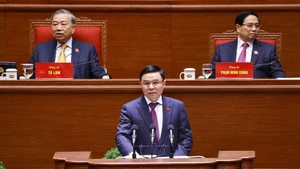If countries with the parent companies all enforce the global minimum tax, these countries will receive an additional tax difference in 2024, which is estimated at more than 12 trillion VND (510.39 million USD).
Thus, tax incentives for foreign-invested enterprises will no longer be effective, posing a significant challenge to maintaining the competitiveness of Vietnam’s investment environment.
Consensus on imposing global minimum tax
According to the rules of the global minimum tax published by the Organisation for Economic Cooperation and Development (OECD)/G20, developing countries participating in the G20/OECD Inclusive Framework on domestic tax base erosion and profit shifting (IF) are not required to apply the provisions of the global minimum tax. However, if they choose to apply these regulations, countries will have to comply with the provisions of the global minimum tax, in accordance with IF rules and instructions.
Finance Minister Ho Duc Phoc said that in the event that a country does not apply global minimum tax, it must still recognise the global minimum tax regulations applied by other IF members.
So far, many countries and territories such as the Republic of Korea, Hong Kong (China), Singapore, and Japan have planned to supplement and amend laws in 2023 to implement the global minimum tax from 2024. These countries and territories have a large amount of foreign investment in Vietnam and many businesses which are subject to the global minimum tax.
If foreign enterprises that have invested in Vietnam continue to enjoy corporate income tax incentives, countries with parent companies will collect the difference in corporate income tax from the actual tax rate compared with the global minimum tax (15%), Minister Ho Duc Phoc emphasised.
The Prime Minister has recently established a special working group to study and propose solutions related to the OECD’s global minimum tax rate, led by Deputy Prime Minister Le Minh Khai. The Ministry of Finance also established a team to support the special working group to urgently devise and conduct Vietnam’s response solutions.
The Ministry of Finance said that because the global minimum tax is a new and important issue with many technical factors, Vietnam needs to focus on clarifying key contents such as: the application of Pillar Two on global minimum tax rate of 15% for multinational companies and the comprehensive assessment of impacts of the global minimum tax on Vietnam, especially impacts on the state budget, investors and Vietnam’s foreign investment attraction.
Therefore, timely and appropriate response solutions are expected to be developed, thus ensuring Vietnam’s tax collection rights as well as the attractiveness of the investment environment.
Ensuring the nation’s tax collection right
According to Deputy General Director of the General Department of Taxation Dang Ngoc Minh, the subjects of the global minimum tax are multinational enterprises (MNEs) with annual revenue of 750 million EUR and above for at least two of the four years preceding the year of review.
However, there are also many entities that will not be subject to the global minimum tax, including: organisations of foreign governments, international organisations, non-profit organisations, pension funds or investment funds that are parent entities of a multinational group, member companies in Vietnam within the same corporation with average revenue of less than 10 million EUR in Vietnam, and others.
It is worth noting that the levying of the top-up tax will either take place at “Ultimate Parent Entity” (UPE) level, that is the parent company of the group, or in the country in which the companies are taxed at a lower rate (domestic top-up tax). On a country-by-country basis, the aim is to ensure that an effective minimum tax rate of 15% applies in each jurisdiction in which one or more group companies and/or permanent establishments operate.
In addition, the global minimum tax allows the country the ability to tax payments that might otherwise only face a low rate of tax. The tax rate for this rule would be set at 9%.
In order to exercise this right, countries must sign a multilateral agreement amending the provisions of avoiding double taxation agreements between countries.
In addition, countries with effective corporate income tax rates of less than 15% are entitled to enact regulations to collect additional taxes, and countries receiving investment are given priority in tax collection before the host country imposes the minimum tax of 15%.
Accordingly, applicable countries will determine the minimum taxable income of the member companies in a particular country in a manner equivalent to the regulation on global minimum tax.
Dang Ngoc Minh noted that the rules aim to increase domestic tax obligations in accordance with the regulations of the global minimum tax. Notably, countries will not provide companies with any benefits directly related to the additional income tax provisions.
















